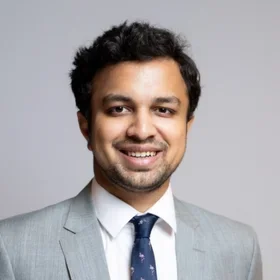After serving in the U.S. Army as a commissioned officer in the Judge Advocate Corps (JAG), Alidu Salifu (’23SPS, Sports Management) was looking for a way to apply his skills in contract negotiation and regulatory compliance to the sports industry. When he discovered Columbia’s M.S. in Sports Management (SPRT) program, which would place him in the center of industry conversations among people changing the future of sports, Salifu knew it was exactly what he’d been looking for.
Salifu enrolled in the SPRT program as a part-time student so he could keep working at Underdog Venture Team, which he says allowed him to apply classroom insights to real-world challenges in real time. “I wasn’t just learning about sponsorship valuations—I was using that knowledge in negotiations,” Salifu said. “The ability to bridge academia and practice simultaneously was one of the most rewarding aspects of my experience.”
We recently spoke to Salifu about his time in the program, the value of the Columbia alumni network in the sports world, and his current role as legal counsel at the U.S. Soccer Federation.
Your Story
Why did you decide to come to the SPRT program?
I have always had a passion for sports. Soccer is part of my DNA, but my interest in working in the sports industry came from understanding its broader impact. Unlike other major sports in the U.S., soccer operates on a truly global scale. The complexities of international governance, commercial structures, and player movement make it a fascinating industry to work in.
When I decided to pursue a graduate degree after serving in the U.S. Army, I was looking for a sports management program that didn’t just teach sports business in the abstract—I wanted a program where I could connect with and learn from leaders in the industry.
Tell us a bit about your role as legal counsel for the U.S. Soccer Federation.
My role revolves around navigating the intersection of law, commerce, and sport. Whether it’s negotiating a landmark sponsorship deal, protecting the Federation’s intellectual property, or advising on governance matters, I operate at the crossroads of business and legal strategy.
Your Faculty
Tell us a bit about your academic experience.
Columbia’s faculty is what makes the program exceptional. Courses in sports sponsorship, media rights, digital media, and negotiations were particularly impactful because they mirrored the exact challenges I navigate in my career. Having instructors who operate at the highest levels of the industry meant that classroom discussions weren’t theoretical—they were rooted in real-time industry dynamics.
Your Curriculum
Are you applying anything you learned from the master’s program to your current role?
Columbia’s program gave me a framework to approach challenges and a deep understanding of sports business. Negotiating a licensing deal isn’t just about contract terms; it’s about understanding brand equity. Structuring a sponsorship isn’t just about legal protections; it’s about aligning commercial incentives. My time at Columbia helped me develop a broader, more strategic lens through which to view my role.
Your City
In your opinion, what makes Columbia’s program unique?
Beyond the knowledge gained, the real value of Columbia’s program is in the doors it opens in New York City and beyond. The program's credibility and alumni network create opportunities outside of the classroom. Sports is a relationship-driven industry, and Columbia places you in the right rooms with the right people at the right time.
Your Columbia
Have you engaged with the Columbia alumni network?
Absolutely. The Columbia alumni network isn’t just a resource—it’s a community. Whether it’s through mentorship, industry events, or collaborative opportunities, staying connected to fellow alumni has been an invaluable part of my professional journey. The network is diverse, influential, and always willing to support one another.
Beyond networking, I’ve had the opportunity to work directly with Columbia alumni both within my own organization and on the other side of deals. At U.S. Soccer, I collaborate with fellow graduates who bring the same rigorous, strategic mindset that Columbia fosters. Additionally, in sponsorship negotiations, talent agreements, and governance discussions, I’ve found myself across the table from Columbia alumni at major brands, agencies, and sports entities. There’s an unspoken understanding and shared perspective that often makes those negotiations more productive. Columbia’s impact extends far beyond the classroom—it’s a professional bond that carries weight across the industry.
What is your advice to students?
Be relentlessly curious. Sports is an industry that rewards those who think differently, challenge the status quo, and anticipate what’s next. And above all, remember that sports isn’t just about contracts and deals—it’s also about culture, passion, and impact. Approach your career with that mindset, and you’ll find yourself not just working in the industry but shaping it.
About the Program
The Columbia University M.S. in Sports Management provides students with a comprehensive curriculum and access to sports industry practitioners and influencers. Students acquire skills in areas such as entrepreneurship and innovation, global sports management, facility and event management, and sports law and ethics. The program is available for part-time or full-time enrollment. Learn more about the program here.


